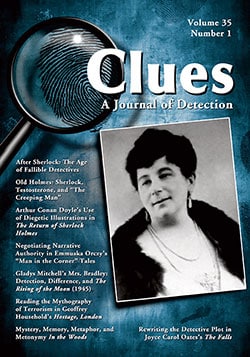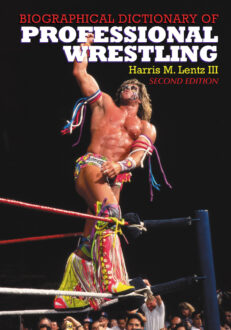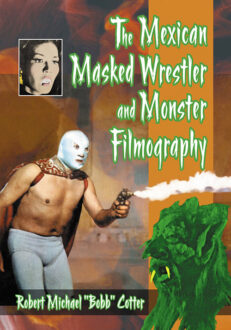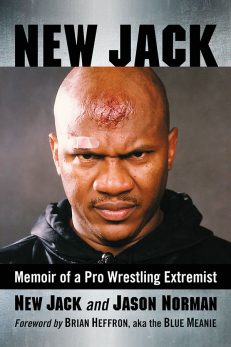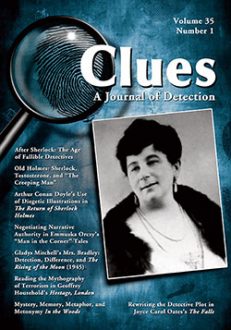Clues: A Journal of Detection, Vol. 35, No. 1 (Spring 2017)
Print Back Issue$30.00
In stock
About the Book
BACK ISSUE
This is a single back issue only. To order a current subscription, or for more information, please visit the journal’s web page at CluesJournal.com. Back issues from earlier volumes of Clues are available for order subject to availability. Also, single issues of the current volume may be ordered one at a time. Individuals may order back issues directly from our online catalog, and the charge for individuals is $30 (excluding postage). Issues from Volume 33 to the present are also available in ebook format on Kindle, Nook and Google Play.
The charge for single issues for institutions is $75 per issue (excluding postage). If your institution requires a back issue, please contact us to order at the appropriate rate.
About the Author(s)
Bibliographic Details
Executive Editor Janice M. Allan
Managing Editor Elizabeth Foxwell
Consulting Editor Margaret Kinsman
Format: softcover (7 x 10), back issue
Pages: 136
Bibliographic Info:
Copyright Date: 2017
ISSN 0742-4248
Imprint: McFarland
Table of Contents
Introduction: Reevaluating the Past and the Present
Janice M. Allan 5
The executive editor of Clues overviews the Table of Contents of Clues 35.1, including works on authors Lee Child, Arthur Conan Doyle, Tana French, Geoffrey Household, Gladys Mitchell, Joyce Carol Oates, and Emmuska Orczy.
After Sherlock: The Age of Fallible Detectives
Maurizio Ascari 8
In the wake of Sherlock Holmes’s success, writers and critics explored the relationship of the fallible detective to the ideological and aesthetic characteristics of the Golden Age. The author examines this phenomenon, shedding light on the transition between the infallible detectives of positivism and the vulnerable detectives of post–World War II psycho-thrillers.
Old Holmes: Sherlock, Testosterone, and “The Creeping Man”
Sylvia Pamboukian 19
Arthur Conan Doyle’s “The Creeping Man” captures the early-twentieth century’s interest in male menopause and hormone replacement. The now-retired Sherlock Holmes and the aged Professor Presbury embody the conflict between aging as diminishment and aging as healthy and vigorous, a conflict
still affecting readers who hesitate to accept Holmes as elderly.
“Look at This Map”: Arthur Conan Doyle’s Use of Diegetic Illustrations in The Return of Sherlock Holmes
Thomas Vranken 29
Four stories from The Return of Sherlock Holmes in the Strand Magazine and Collier’s Weekly featured hand-drawn maps and other visual material supposedly created by Arthur Conan Doyle’s characters. These peculiar diegetic phenomena serve an ambivalent, even contradictory, function, both drawing in and repulsing the reader.
Arthur Conan Doyle’s Lens
Katherine Voyles 40
The author argues that relations of scale are central to the late–nineteenth-century detective fiction of Arthur Conan Doyle, in which the movement between large and small, far and near, and the distant and the intimate is condensed by making Sherlock Holmes’s own vision the locus of that movement.
True Cock-and-Bull Stories: Negotiating Narrative Authority in Emmuska Orczy’s “Man in the Corner” Tales
Rachel Smillie 51
Critical studies of Baroness Emmuska Orczy’s “Man in the Corner” narratives have been dominated by the collected edition The Old Man
in the Corner; however, this edition fundamentally alters the dynamic of the original stories. Revisiting the original tales, this article interrogates the relationship among detective, narrator, and reader.
Gladys Mitchell’s Mrs. Bradley: Detection, Difference, and The Rising of the Moon (1945)
Lee O’Brien 63
A sharp sense of parody leavens the realist modes of Gladys Mitchell (1901–83), producing novels that both abide by and subvert the rules of Golden Age detection. The Rising of the Moon (1945) is her finest novel, one that uses its formal “play” to register moving questions of human desire and agency.
Nancy Drew and the Ivory Tower: Early Academic Study of the Girl Detective
Julie Still 75
Although the Nancy Drew mystery series has had a consistent readership, very little early scholarly research was done on the books or the character. The journal literature from 1930 to 1993 reveals four areas of study: Nancy’s independence, her sexual identity, racial and ethnic stereotypes in the books, and business and legal issues regarding the books and film adaptations.
Reading the Mythography of Terrorism in Geoffrey Household’s Hostage, London: The Diary of Julian Despard
Robert Lance Snyder 85
Framed as a fictive diary, Geoffrey Household’s Hostage, London (1977) addresses the threat of nuclear terrorism in the West. Through his narrative, protagonist Julian Despard struggles to understand his divided allegiances, documenting the moral vacuity of ideologically driven terrorism.
Mystery, Memory, Metaphor, and Metonymy In the Woods
Rachel Schaffer 93
Five mysteries by Tana French take place in the woods near Knocknaree, Ireland. Through metonymic associations of the woods, as well as narrative techniques from hard-boiled and gothic traditions, French examines issues related to the mutability of memory, the lingering effects of the past on present lives, and the economic shifts affecting Irish identity and society.
Thrill or Angst? Metaphysical Implications of Rewriting the Detective Plot in Joyce Carol Oates’s The Falls
Tanya Tromble 103
A growing number of Joyce Carol Oates’s novels are a peculiar sort of “whydunit.” In Oates’s The Falls (2004), her detectives occupy a middle ground between the Golden Age detective and the hard-boiled hero—one example of the metaphysical detective story in her fiction that resists even this wide-ranging designation.
The Lonely Road to Freedom: Jack Reacher’s Interpretation of an American Myth
Jeroen Vermeulen 113
Jack Reacher, created by British-born Lee Child, rejects the myth of the American dream in all its guises and straddles two emblematic American genres—cowboy and hard-boiled detective fiction—in his quest for absolute, utopian freedom. Paradoxically, this turns him into a quintessentially American character.
REVIEWS
Lucy Sussex, Blockbuster! Fergus Hume and The Mystery of a Hansom Cab. Christopher Pittard 124
Fiona Peters and Rebecca Stewart, eds. Antihero. David Rachels 126
Barry Forshaw, ed. Detective. Tom O’Brien 128
Karen Huston Karydes. Hard-Boiled Anxiety: The Freudian Desires of Dashiell Hammett, Raymond Chandler, Ross Macdonald, and Their Detectives. Philip Castille 130
Katharina Hall, ed. Crime Fiction in German: Der Krimi. Stephen Knight 132
Andrew Pepper. Unwilling Executioner: Crime Fiction and the State. Stewart King 134
Author Guidelines are on page 136
Book Reviews & Awards
- “Clues is a must-have for readers and writers of crime fiction. Scholarly, thought-provoking, wide-ranging in its topics, Clues covers the crime and thriller map.”—Sara Paretsky
- “A. Conan Doyle, notoriously resentful of Sherlock Holmes’s success, liked to scorn ‘police romances’ as less significant and worthy of his talents than his other literary work. If he could have read Clues, the thinking mystery reader’s journal, he would surely have felt differently—and learned much he never realized himself about even his own landmark contribution to the genre, from which so much else by others has flowed.”—Jon Lellenberg, U.S. agent for the Arthur Conan Doyle estate
- “I love reading Clues. Every issue provides thought-provoking, well-researched articles. The variety and scope of the material found in Clues makes an unparalleled, ongoing contribution to our understanding of the role of crime fiction in our culture, and the genre’s reflection of its time and society.”—Jan Burke, Edgar-winning author of The Messenger (2009)
- “Clues is an important journal. It carries the torch of tradition that is the backbone of detective fiction. It goes below the surface and gets to the heart of what makes the genre so fascinating and valid today”—Michael Connelly, author of the Harry Bosch novels, including The Overlook (2007)
- “for erudite and fascinating truths about mysteries, follow the clues to Clues, the scholarly journal that is an essential resource for every serious student of the mystery”—Carolyn Hart, author of Death Walked In (2008)
- “with scholarship ranging from Poe to Peters, nothing beats Clues”—Joan Hess, author of Mummy Dearest (2008).


